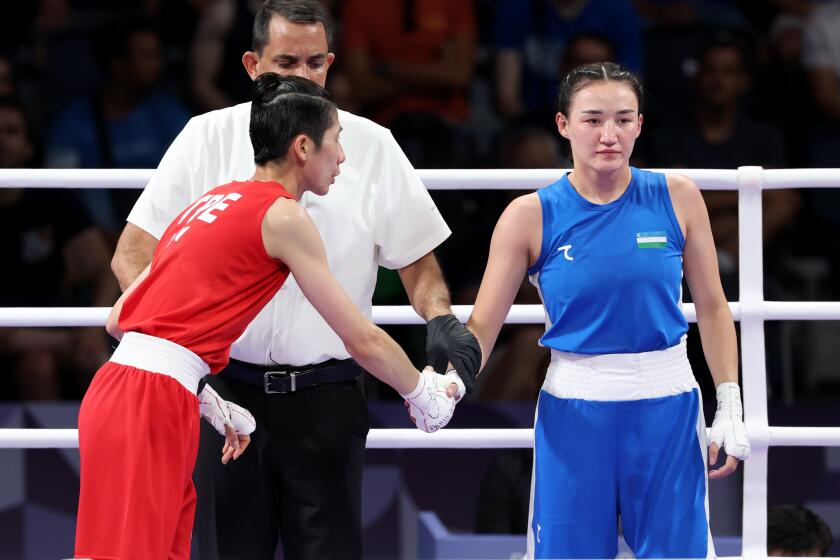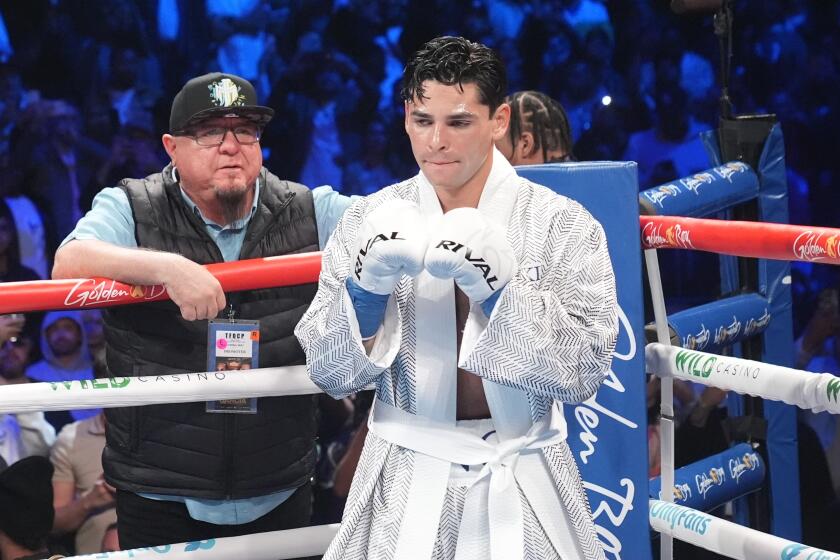‘Tyson’ is a knockout in, out of ring
Director Sam Fuller never met Mike Tyson. But when Fuller famously called film “a battleground” and ticked off the components -- “love, hate, action, violence; in one word, emotion” -- he might have been describing the fighter’s life. Or as Tyson himself said to James Toback after seeing the director’s compelling new documentary, “It’s like a Greek tragedy. Only I’m the subject.”
“Tyson” is not your conventional film biography. There is no variety of viewpoints, no back and forth about notorious episodes in his life and, except for interview footage from the past, no other voices heard or points of view entertained, no matter how controversial the topic.
What you get instead is Tyson, former heavyweight champion, former substance abuser, former prison inmate, talking in a quiet voice with that unexpected slight lisp, holding you spellbound with his thoughts on his past. The result is as gripping as a title fight and as mesmerizing as a conversation with a cobra. You may not be happy with everything said, but you will not be bored.
“Tyson” does more than let the man talk. It provides a large number of filmed glimpses into Tyson’s past, starting off with clips from one of the fighter’s defining moments, the 1986 victory over Trevor Berbick that made him, at just barely 20, the youngest heavyweight champion ever.
Actually, the word “victory” doesn’t begin to do justice to the savage nature of Tyson in the ring. He takes Berbick apart with a ferocity that is almost terrifying, a ferocity that led to knockout victories in his first 19 bouts, 12 of those in the first round. And, as a chilling clip of the fighter verbally assaulting a reporter at a news conference shows, Tyson could be just as intimidating outside the ring.
What we see in “Tyson,” however, is not so much a different person as another, unexpected side of the same person, a more thoughtful, introspective aspect of someone who clearly means it when he says he never thought he’d live to be 40 (he’ll be 43 in June). Toback has said in interviews that what interested him about Tyson, whom he’s known for more than 20 years, is “the balance of fragility and rage,” and that definitely comes across.
Toback, whose dramatic features include “Fingers,” “Exposed” and “The Pick-Up Artist,” has never been known as a restrained director, but, except for some split-screen imagery and multitracking of Tyson’s voice, he stays largely in the background here. But though we don’t hear him talking, Toback’s presence was clearly a factor in Tyson’s willingness to explore how he became the man the world viewed with equal parts fascination and fear.
It is, frankly, Tyson’s childhood memories that are the most moving and memorable parts of the film. His depiction of a young childhood in which he was bullied and brutalized in the Brownsville section of Brooklyn is quite something, as are his involuntary tears when he recalls how his fears of being bullied and of being humiliated again were essential in driving him forward.
Into crime before he was a teenager, Tyson was sent to a juvenile detention center in upstate New York where his boxing potential was recognized and, at age 14, he was introduced to Cus D’Amato, a trainer/manager who’d worked with Rocky Marciano, Floyd Patterson and Jose Torres.
The teenage Tyson and the seventysomething D’Amato saw something in each other, and their intense connection was the key emotional relationship of the fighter’s entire life. “He’d tell me, ‘You have a chance to change your life, you could devastate the world,’ and I started believing in this old man,” Tyson relates. When D’Amato died five years later, Tyson felt “scared, alone, vulnerable, naked to the world,” and the question of the direction his life would have gone had this surrogate father lived longer hangs over the entire film.
As it was, Tyson’s story, both personally and professionally, became tabloid fodder. The fighter talks candidly about his ill-fated marriage to actress Robin Givens (“The whole world was in our business,” he says sadly) as well as the rape conviction that continues to infuriate him and led to three years in prison, an experience he characterizes as “the closest thing to death.”
Professionally, Tyson’s career had no shortage of drama either. He lost the championship in 1990 to a 42-1 shot named Buster Douglas whom he had neglected to take seriously, and his uncontrollable fury at what he considered to be head-butting by Evander Holyfield in 1997 led to an episode of ear-biting that ended his chances for another championship. “I have the mind of an extremist,” Tyson says at one point, “I don’t know how to live in the middle,” and if this unsettling documentary does nothing else, it proves that without a doubt.
--
--
‘Tyson’
MPAA rating: R for language, including sexual references.
Running time: 1 hour, 28 minutes
Playing: In limited release.
More to Read
Go beyond the scoreboard
Get the latest on L.A.'s teams in the daily Sports Report newsletter.
You may occasionally receive promotional content from the Los Angeles Times.











